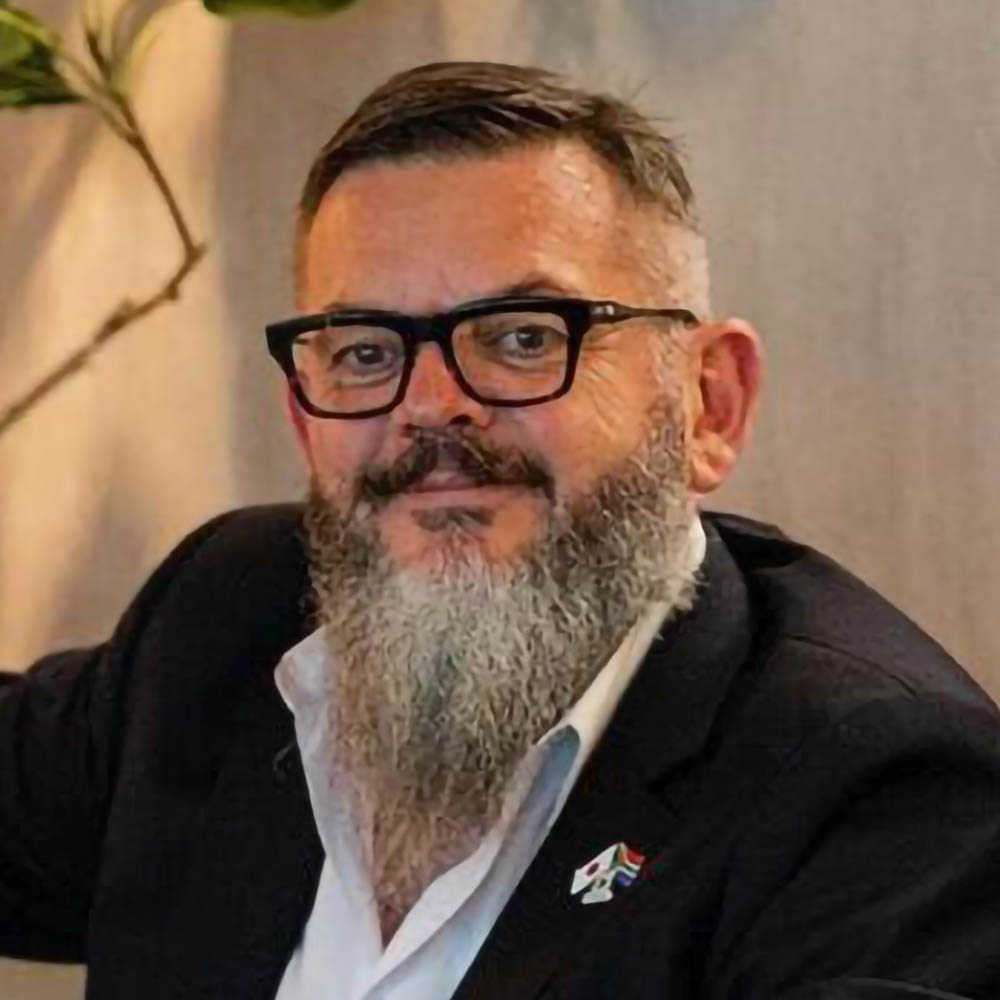South Africa and Japan celebrate 115 years of diplomatic relations, with ties expanding across trade, investment and innovation. In 2023, bilateral trade reached nearly ¥9 billion, driven by South Africa’s exports of minerals, precious metals and agricultural products, alongside growing collaboration in renewable energy, hydrogen and climate research.
The South African Chamber of Commerce in Japan (SACCJ), founded in 2008, has become a trusted platform for dialogue, business networking and cultural exchange, helping deepen these connections. In this Bridges Q&A, Simon Farrell, Chairman of the SACCJ, highlights South Africa’s role as a gateway to Africa and the opportunities shaping future cooperation.
Bridges: In light of the 115th anniversary of diplomatic relations, what do you see as the most significant achievements and opportunities in South Africa–Japan trade and business collaboration?
Farrell: Japan is one of South Africa’s major economic partners. There are now more than 270 Japanese companies operating in SA, sustaining more than 200,000 jobs. In 2023, total trade was around ¥9 billion, with SA enjoying a surplus. Key exports from SA to Japan include minerals (platinum, coal, manganese, titanium) , precious metals and agricultural goods such as citrus, wine, avocados and tea. SA has also become a market leader in Japan’s medical cosmetic sector.
In science, technology and innovation, there has been growing cooperation via joint research, exchange and tech projects (green hydrogen, renewable energy, climate forecasting). Formal institutions focus on trade, investment and development issues and Memorandums of Understanding (autos supplier development, renewable energy).
SA has been pushing to collaborate with Japan on green industrialization, EV technologies, hydrogen and renewable energy equipment. Traceability, sanitary and phytosanitary standards are also raising SA’s competitiveness in high-value agricultural exports. Since 2003, we have seen more than ever science and technology cooperation agreements, research grants, exchanges of young scientists, technical cooperation and skills development linked with Japanese firms operating in SA.
For future opportunities, SA lies geographically and economically as a gateway into Southern Africa and has the experience, institutions and infrastructure that can support wider Japanese investment. Given SA’s minerals needed for batteries, fuel cells and hydrogen, there’s huge potential. Manufacturing of auto components and EV battery systems could see more Japanese-SA joint ventures or even SA becoming a component hub. SA also has great potential in sun and wind resources and cost advantages, which could attract Japanese investment or technological partnership.
Encouraging more SA SMEs to supply Japanese firms could build local content and technology transfer and embed more value locally. More joint R&D with a view toward commercialisation (not just academic) and technology transfer linking labs with business is another potential, as is innovation around climate resilience, agriculture and healthcare.
To achieve more, SA would like Japan to lower its import barriers and Tokyo wants SA to improve its logistics and simplify customs and border procedures.
How is the Chamber helping South African companies and talent tap into Japan’s market, particularly as both countries advance strategic sectors like critical minerals, renewables and high-tech manufacturing?
As the co-founding publisher of Tokyo-based PR, Communications and Market Entry specialists Custom Media and a board director of the Japan Market Expansion Competition (JMEC), I source bilateral news and information about business opportunities, contacts and events for SACCJ members. This includes SA, Japanese and global firms in the sectors of precious metals, mining and luxury goods as well as SMEs selling tea, healthcare and security products. My other pro bono work is as statutory auditor of The Foreign Correspondents’ Club of Japan and as board director or media consultant of three other NPOs involved in animal rescue, refugees and historical preservation.
Through the Chamber, members get connected to potential business partners, experts, vendors, clients and suppliers. We help SA firms understand regulations, culture, customers, distribution and technology trends in Japan.
I would personally like to see Japan offer more internships with technical, language and cultural training so SA talent can build ties with Japan.
The SACCJ strives to be a reliable first point of contact for businesses and individuals in SA and Japan, and to provide our members with access to information, events and contacts to assist in their businesses.
Simon Farrell, Chairman of the South African Chamber of Commerce in Japan (SACCJ)
With the outcomes of TICAD9 and ongoing efforts to accelerate bilateral trade and investment, what emerging trends or areas of partnership should business leaders in both countries watch most closely?
Since TICAD9 earmarked billions of dollars toward joint finance frameworks in Africa, business leaders should pay close attention to manufacturing, green technologies, agro-industrial zones, digital transformation, infrastructure, connectivity, energy, transport, food security as well as human capital such as youth, skills, health and vocational training.
SA has abundant solar and wind resources and critical minerals while Japan is pushing energy transition, sustainability and climate finance. There is already interest in green hydrogen by Japanese firms in SA.
As in many countries around the world, Japanese business leaders should also watch for potential risk factors in SA and the rest of Africa such as policy consistency, regulatory clarity, infrastructure bottlenecks, currency swings, security and political risk as well as skills, tariffs and environmental responsibility.
Can you share how the Chamber is building cross-cultural understanding and practical networking between South African and Japanese professionals, and why this is crucial for future economic growth?
The SACCJ has been promoting bilateral trade, two-way commerce, diverse friendship and cultural understanding since it was founded in 2008. The SACCJ strives to be a reliable first point of contact for businesses and individuals in SA and Japan, and to provide our members with access to information, events and contacts to assist in their businesses.
Annual events such as the Rainbow Nation Heritage Day dinner and dance held in October 2025 combine music, food and cultural expression for Japanese and expats to interact informally. We also help arrange social and professional networking events such as panels and joint chamber of commerce networking mixers. In 2023 we partnered with the prestigious Tokyo American Club to celebrate our 15th anniversary with about 350 guests.
The SA Ambassador has traditionally served as the SACCJ Honorary Chairman and has often hosted our braais and other events at the Official Residence in Tokyo. SA Embassy officials have sat on our Board and overseen our elections which democratically and carefully appoint Directors for their diversity, networks and know-how, with the present ones from the media, logistics, healthcare and academic sectors.





